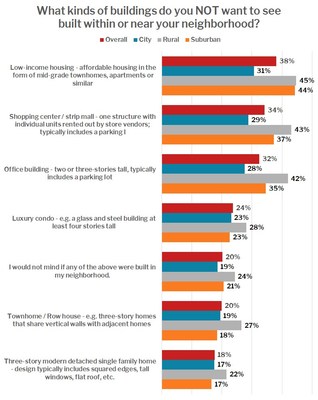Redfin Survey: Most Suburban Residents Wouldn't Mind a Low-Income Housing Development in Their Neighborhood
SEATTLE, Oct. 22, 2020 /PRNewswire/ -- (NASDAQ: RDFN) — Thirty-eight percent of homebuyers and sellers don't want to see low-income housing in their neighborhood, according to a new report from Redfin (www.redfin.com), the technology-powered real estate brokerage. That's roughly the same share as in November 2019, when 39% of respondents said the same thing. The report is based on findings from an August Redfin survey of more than 1,400 U.S. residents who plan to buy or sell a home in the next 12 months.
More people oppose low-income housing—which the survey question defines as "affordable housing in the form of mid-grade townhomes, apartments or similar"—in their neighborhood than any other type of building. Shopping centers, which 34% of all respondents oppose, and office buildings (32%) come next.
President Trump suggested that people who live in the suburbs are opposed to low-income housing when his administration rescinded a 2015 federal rule called Affirmatively Furthering Fair Housing, meant to combat discrimination by requiring local governments to proactively ensure fair housing to receive federal housing funding. Joe Biden has pledged to reinstate the rule if he is elected. In addition to reinstating the rule, Biden's $640 billion housing plan would combat discriminatory housing practices and support building more low-income housing and single-family homes in urban, suburban and rural areas.
Redfin broke out the survey results by respondents' neighborhood type to see if rural and suburban dwellers are more likely than city residents to oppose low-income housing in their neighborhoods.
While people who live in rural and suburban areas are more likely to oppose low-income housing in their neighborhood than city dwellers, less than half of people from each neighborhood type are opposed: Forty-five percent of rural residents and 44% of suburban residents oppose low-income housing, versus 31% of people who live in the city. Rural and suburban residents are also more likely than city residents to oppose nearly every other building type in their neighborhood.
"Although research indicates that low-income housing doesn't increase crime or substantially reduce nearby property values, there's still a misconception that housing for low-income people degrades a neighborhood," said Redfin chief economist Daryl Fairweather. "People who live in urban areas are less likely to harbor the misconception, likely because they already live among a more economically diverse population."
"Building different types of housing in suburban, urban and rural neighborhoods alike helps to desegregate communities, which is one of the first steps in combating systemic racism and other inequalities," Fairweather continued. "Passing national zoning reform and requiring all neighborhood types to allow affordable housing could help close the gaps in education, homeownership and wealth."
People who live in swing states are most likely to oppose low-income housing in their neighborhood
Forty-three percent of swing-state residents don't want to see low-income housing in their neighborhood, versus 41% of people in red states and 33% of people in blue states.
"Biden has focused his housing policies on supporting low-income Americans who have been excluded from certain neighborhoods because they can't afford housing," Fairweather said. "In contrast, President Trump is responding to the anxiety some people feel about low-income housing entering their neighborhoods, which may be a bigger issue in red states and the collection of swing states that matter most in this year's election, according to the survey results."
White people are most likely to oppose low-income housing in their neighborhood
When broken down by race, white respondents are most likely to oppose low-income housing in their neighborhood and Black respondents are least likely. Forty-one percent of white people are opposed, followed by 35% of Asian people, 33% of Hispanic people and 26% of Black people.
Thirty percent of Asian respondents said they wouldn't oppose any building types in their neighborhood, more than any other race, followed closely by 29% of Black respondents.
To read the full report complete with charts of Redfin's survey findings, please visit: https://www.redfin.com/news/suburban-urban-low-income-housing-survey
About Redfin
Redfin (www.redfin.com) is a technology-powered residential real estate company, redefining real estate in the consumer's favor in a commission-driven industry. We do this by integrating every step of the home buying and selling process and pairing our own agents with our own technology, creating a service that is faster, better and costs less. We offer brokerage, iBuying, mortgage, and title services, and we also run the country's #1 real estate brokerage search site, offering a host of online tools to consumers, including the Redfin Estimate. We represent people buying and selling homes in over 90 markets in the United States and Canada. Since our launch in 2006, we have saved our customers over $800 million and we've helped them buy or sell more than 235,000 homes worth more than $115 billion.
For more information or to contact a local Redfin real estate agent, visit www.redfin.com. To learn about housing market trends and download data, visit the Redfin Data Center. To be added to Redfin's press release distribution list, email press@redfin.com. To view Redfin's press center, click here.
![]() View original content to download multimedia:http://www.prnewswire.com/news-releases/redfin-survey-most-suburban-residents-wouldnt-mind-a-low-income-housing-development-in-their-neighborhood-301157766.html
View original content to download multimedia:http://www.prnewswire.com/news-releases/redfin-survey-most-suburban-residents-wouldnt-mind-a-low-income-housing-development-in-their-neighborhood-301157766.html
SOURCE Redfin
Released October 22, 2020





















